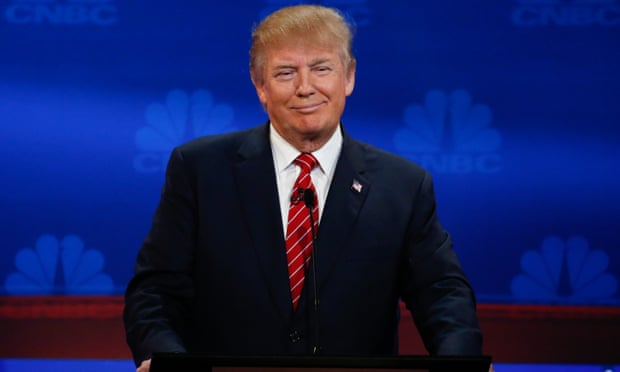Donald Trump has inflicted a body-blow on attempts by prospective Republican presidential candidates to control future debates by announcing that his campaign will negotiate directly with television networks, and not in tandem with his fellow GOP hopefuls.
Trump’s move, confirmed by the Guardian, came almost immediately after almost all the Republican presidential campaigns, including Trump’s, held a meeting in an attempt to work out a detailed letter of demands for networks hoping to host a debate. However, in a press conference in New York on Tuesday, Trump said he did not care much what happened on the debate stage. “I want a room; I want a podium; let’s get going.”
Trump said he thought that the questions asked in the CNBC Republican primary debate – especially those asked of him personally – differed from those asked of Hillary Clinton in the previous Democratic debate. “She only got softballs, that’s all she got,” he said. “And if you look at the way we were treated, it wasn’t the same way.
“That being said,” he added, “I don’t really care.”
Many in the Republican field had been outraged at what they saw as an unfair grilling by CNBC reporters at the debate last week. The crowd booed several of the questions on the night; soon after, the Republican National Committee chair, Reince Priebus – who called the debate a “crap sandwich” on Fox News on Friday – announced that a debate scheduled for February with NBC and Spanish-language network Telemundo would be suspended because NBC and CNBC are owned by the same umbrella organisation.
At a meeting on Sunday, campaign staff from almost every GOP campaign save that of former Hewlett Packard CEO Carly Fiorina met to discuss the terms of a letter, which would be sent to networks before the party would allow them to host a debate. In a draft copy of the letter obtained by reporters at theWashington Post, the campaigns ask that moderators abandon “lightning rounds”, give the campaigns pre-approval of any graphics, and insist on minimum times for opening statements.
The letter, which was drafted by GOP lawyer Ben Ginsberg, also demanded that networks pledge to abandon crowd reaction shots and not to allow candidates to bring props or pledges, leave microphones on during breaks, or describe how far away the bathrooms are. It also asked them not to allow candidate-to-candidate questioning – in other words, debating.
However, just hours after the content of the letter was leaked, Trump’s campaign made clear they would not be cooperating in the effort. In addition to Trump, the campaigns of several other candidates including Fiorina, Governor John Kasich of and Governor Chris Christie of New Jersey have said they would not sign on to the letter.
Trump told reporters on Tuesday that he thought there were too many candidates on the debate stage and that some of his Republican rivals should drop out. “There are too many people. If a person’s been campaigning for four or five months, and they’re at zero [points in the polls], they should get out.”
Tim Groeling, the chair of the communications studies department at UCLA and the author of When Politicians Attack: Party Cohesion in the Media, told the Guardian that the candidates “[had] a bit of a point” with regard to the comparative aggression of the questions between the CNN Democratic debate and the CNBC Republican debate, but said that attacking the media was a “no-lose proposition” for Republican candidates politically.
He said that for any party, the balance was between the “eventual benefit of a candidate to have gone through some aggressive questioning in [the early] stage of the campaign” and the concern that the questioning might damage the eventual candidate by forcing them to take aggressive stances, including against each other.
Since the rise of the primaries to national importance in the 1970s there has been a tension between the candidates and the networks about who should have the most control over proceedings, according to Thomas Steinfatt, a lecturer in communication at the University of Miami who studies political communication.
“One way it’s traditionally been done – but networks don’t like it – is to preview the questions,” he said. “On the one hand, that smacks of controlling the debate; the networks aren’t going to like that because they can be accused of kowtowing. On the other hand, they can ask much more pointed questions about policy.”
For Alex Keyssar, a professor of history and social policy at Harvard’s Kennedy School of Government, having Trump in the debates was the real reason for the tonal shift. “Thanks largely to Trump, the first debates became entertainment events,” he said, adding that this was in part because of the real-estate mogul’s willingness to insult the other candidates. “The network, CNBC, kind of got on that bandwagon and began viewing it in similar terms,” he said.
On Tuesday, Trump appeared to agree. “I like the debates, I’ve done well at the debates,” he said in the press conference. “All the polls said I won all three … even CNBC’s poll said I won.
“I like the debates, I think they’re good for me,” he added.

0 comments:
Post a Comment